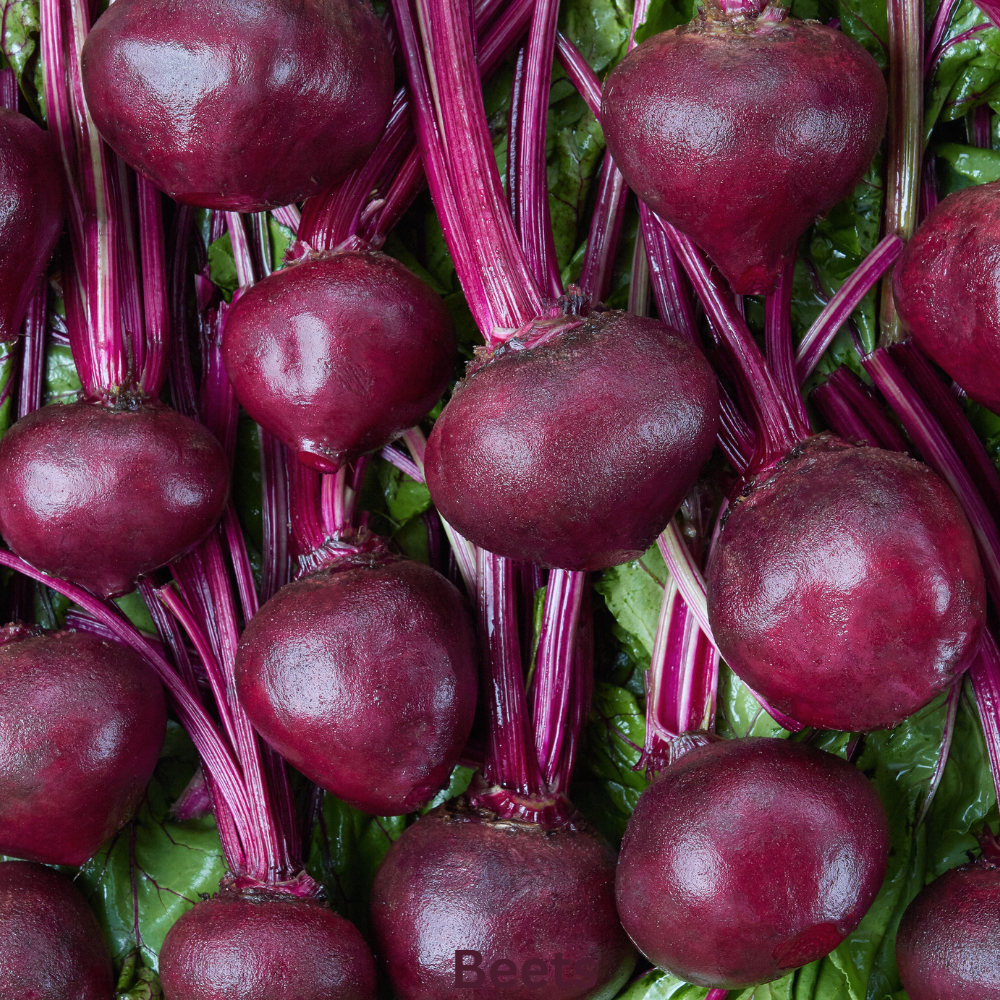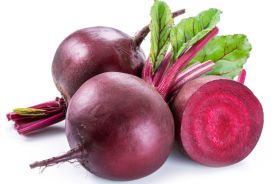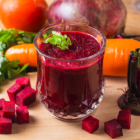Beets, a vegetable which you also call beetroots, are highly nutritious and offer numerous health benefits. These are vibrant and versatile vegetables recognized for their earthy flavor and rich nutritional profile. Beets are also known as superfoods because this vegetable is packed with essential vitamins, minerals, and plant compounds that offer numerous health benefits. In this blog, we will highlight the health benefits of beets and help you know why these are known as nutritional powerhouses.

Nutrients and Calories Present in Beets:
Beets are low in calories but high in valuable nutrients. The vegetable belongs to the Chenopodiaceae family, which also includes chard and spinach. Like spinach and other produce of its family, beets too are known for their high nutrient levels:
Here are some key nutrients found in beets:
- Vitamins include vitamin C, folate, and various B vitamins.
- Minerals like potassium, manganese, magnesium, copper, and iron.
- Rich in protein, fats, and carbohydrates too
- A good source of fiber
- It contains antioxidants like betalains, which have rich antioxidant properties.
Beets are good for body growth, development, bone formation, and heart health. Adding it to your diet also helps in nutrient metabolism and energy production
9 Amazing Health Benefits of Beets:
Let’s move to explore the amazing health benefits of eating beets after which we are sure that you will not exclude it from your daily diet!
Blood Pressure Regulation:
Beets have been well-studied for their ability to lower elevated blood pressure levels. The high concentration of nitrates in beets converts to nitric oxide in the body, which dilates blood vessels and helps reduce blood pressure. Consuming beetroot juice can significantly lower both systolic and diastolic blood pressure.
Enhance Stamina:
Beetroot and its juice can significantly boost your stamina by improving heart and lung function during exercise. The nitric oxide in beets increases blood flow to muscles, which helps you perform better physically.
Athletic Performance Enhancement:
Dietary nitrates in beets can enhance athletic performance by improving the efficiency of mitochondria, the energy-producing components of cells. Beet juice can increase endurance, boost cardiorespiratory performance, and improve oxygen use during exercise.
Anti-Inflammatory Properties:
Beets contain pigments called betalains, which have anti-inflammatory properties. These compounds can help reduce inflammation, which is linked to conditions like heart disease, liver disease, and cancer.

Digestive Health:
Beets are an excellent source of dietary fiber and fiber is good for gastric health. This is how fiber aids in digestion, promotes gut health and helps prevent digestive issues like constipation and inflammatory bowel disease.
Aids in Detoxification:
Beets are powerful detoxifiers due to their betalains, which offer antioxidant and anti-inflammatory benefits. These pigments support liver function and promote the body’s detoxification process. High in fiber, beets also aid digestion and help remove waste and toxins. Regular consumption enhances natural detox pathways, contributing to overall health.
Brain Health:
The nitrates in beets may improve brain function by increasing blood flow to the brain. This is particularly beneficial for the frontal lobe, which is involved in higher-level thinking and decision-making. Some studies have shown that beetroot juice can improve reaction time and cognitive function.
Anti-Cancer Potential:
Beets contain several compounds with cancer-fighting properties, including betaine, ferulic acid, and caffeic acid. Research has shown that these extracts can slow the growth of cancer cells.
Energy Balance:
Beets are low in fat and calories but high in water, making them a great addition to a balanced diet. They also contain moderate amounts of protein and fiber, which can help you feel full and satisfied, supporting weight management.
Interesting Facts About Beets:
Here are some interesting facts about beets:
- Beet juice is often used as a natural dye for food and cosmetics due to its vibrant red color.
- Eating lots of beets can cause beeturia, where urine turns pink or red
- Beets have been cultivated since ancient times, with evidence of their use by the Romans for medicinal purposes.
- The leafy top of beets are edible and can be cooked like spinach or Swiss chard.
- In ancient Rome, beets were considered an aphrodisiac. The Romans believed that beets had properties that could enhance romantic feelings and desires.
- While the red beet is the most common, beets come in several varieties, including golden beets, which are yellow, and Chioggia beets, which have a striking red-and-white striped interior.
- Beets are relatively easy to grow and have a low environmental impact. They are a sustainable crop that can thrive in various climates and soils.

Beets are highly nutritious and offer numerous health benefits, from supporting heart and brain health to improving athletic performance and digestion. This vegetable is also delicious while eating raw, roasted, or adding to your drinks or cooking.
Health Benefits of Beets:
Beets are packed with nutrients and offer numerous health benefits. They are rich in vitamins and minerals such as folate, manganese, potassium, and vitamin C. Beets are known to improve blood flow, lower blood pressure, and enhance exercise performance due to their high nitrate content. They also support liver health, aid in detoxification, and provide antioxidants that help fight inflammation and oxidative stress.
Health Benefits of Red Beets:
Red beets, specifically, offer benefits such as lowering blood pressure, improving cardiovascular health, and enhancing athletic performance. The nitrates in red beets help dilate blood vessels, improving blood flow and oxygen delivery to muscles. They are also rich in fiber, promoting digestive health and helping to regulate blood sugar levels.
Health Benefits of Beet Hummus:
Beet hummus combines the benefits of beets with those of chickpeas, tahini, and other ingredients. This nutritious dip provides a good source of protein, fiber, and healthy fats. It supports heart health, improves digestion, and offers anti-inflammatory properties. The beets in the hummus add additional antioxidants and nitrates, further boosting cardiovascular health and overall well-being.
Health Benefits of Beet Juice Powder:
Beet juice powder is a concentrated form of beets that provides similar benefits in a convenient form. It supports cardiovascular health by lowering blood pressure and improving blood flow. The high nitrate content enhances exercise performance and endurance. Beet juice powder also provides antioxidants that reduce inflammation and protect against chronic diseases.
Health Benefits of Beets for Piles:
Beets can be particularly beneficial for those suffering from piles (hemorrhoids). Their high fiber content helps prevent constipation and promotes regular bowel movements, reducing the strain on hemorrhoids. The anti-inflammatory properties of beets can also help reduce swelling and discomfort associated with piles. Additionally, beets support overall digestive health, which is crucial for managing and preventing hemorrhoids.
Health Benefits of Beets for Men:
Beets are a powerhouse of nutrients that offer significant health benefits for men. Rich in nitrates, they improve blood circulation and enhance cardiovascular health, which can boost athletic performance and endurance. Beets are also known to support healthy testosterone levels due to their high boron content, which plays a role in hormone regulation. Additionally, their natural antioxidants help reduce inflammation and support prostate health, making them an excellent dietary choice for men.
Health Benefits of Beets for Skin:
Beets are packed with vitamins and antioxidants that promote glowing, healthy skin. Their high vitamin C content helps combat free radicals, reducing signs of aging like wrinkles and fine lines. Beets also detoxify the blood, leading to clearer skin and a reduction in acne. Their natural anti-inflammatory properties soothe skin irritation, while their rich iron content improves oxygenation and gives skin a radiant appearance. Adding beets to your diet or skincare routine can lead to visibly healthier skin.
Health Benefits of Beets for Women:
Beets are especially beneficial for women due to their rich nutrient profile. They are an excellent source of folate, which is vital for women during pregnancy as it aids in fetal development. Beets also help regulate blood pressure and improve cardiovascular health, which is particularly important during menopause. Additionally, the iron in beets supports healthy blood production and reduces the risk of anemia, a common concern for women. Regular consumption of beets can contribute to overall well-being and hormonal balance.
Frequently Asked Questions
Can you eat beets every day?
Yes, you can eat beets every day but it is best to follow a varied diet. Eating beets daily is unlikely to harm, but excessive intake could lead to low blood pressure and digestive issues. Try incorporating beets in healthy fruit salads!
Are beets a superfood?
Yes, beets are often considered a superfood due to their rich nutrient content and health benefits.
How should I include beets into my diet?
Beets can be consumed in various forms, such as raw, cooked, roasted, or juiced. They can be added to salads, soups, smoothies, and more.
How often should I eat beets to see health benefits?
Including beets in your diet, a few times a week can provide health benefits. Regular consumption supports detoxification and overall well-being.



